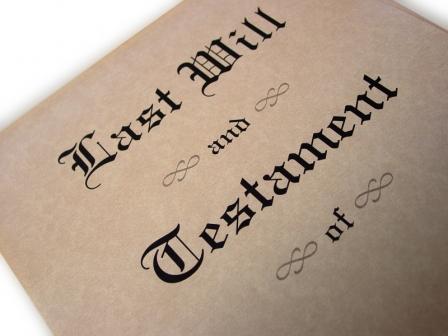How To Make A Will Legally Hold Up In Court
How To Make A Will That Is Legally Binding
Most people now days don't possess enough money to have to worry that their will is strong enough to hold up in court. However, it is still helpful to make your will as professional and well written as possible. That's where this step by step guide on how to make a will comes in.
Follow each of the steps below on you will have a solid, legal will written in no time.

Step 1
Fire up a professional word processing program, such as Microsoft word and state the title of the document at the top of the page. Writing 'My Last Will and Testament' in large, bold lettering at the top of the page should do just fine.
Now, below that, you need to state your declaration to help clarify and legalize things, just in case the event that the need arises. Write out your full name, your legal street address and a declaration that you are still in good mental shape, this is your last will and testament (which makes any other possibly forged documents claiming to be your will invalid) and that you are not being coerced, manipulated or threatened into writing this.
If you fill the need to specify anything else here, feel free.
Step 2
Provide the name of your executor. Normally this would be your spouse, if they are still alive. However, if either they have already passed on by the time you have or they are no longer around for any reason after you pass on, you should have a back up executor listed as well. Your back up executor could be your eldest or most trusted child, another relative or even a good friend. Just be sure to list their full legal name and address of residence to make this legally valid and strong.
Your deemed executor will be responsible for seeing to it that all of your beneficiaries are given what you have assigned to them in one of the steps below.

Step 3
Provide the full name of who you wish the guardian of of your under age children to be, in the case that you have any. Even if you have a living spouse at the moment of writing this, you should name a friend or relative just in case your spouse is no longer around when you pass on.
Take great care when choosing a potential guardian, because they will be responsible for caring for you children for the long haul.
Step 4
Clearly list the names of your beneficiaries and make it clear who is entitled to what. Make a new section that lists each of your children and other friends and relatives out one by one, from top to bottom, including a detailed description of how much money and which belongings of yours each are entitled to.
Also include who is entitled to which of your assets. List exact names to make sure there is no room for debate on who you were referring to.
Step 5
Be sure to detail and explain the arrangements for your funeral. This is the section to detail your specific requests on what you would wish to have done to your body. Whether it's being cremated or buried at a certain graveyard, be sure to thoroughly detail out what you wish to have done. Also, if you have any special requests for your funeral, such as who you would like to speak about what or which musical numbers you would like to have played, be sure to include them here as well.
You may also wish to discuss finances for the funeral here.
Conclusion
Conclude the will by printing out the typed form and signing your name at the bottom. Collect signatures of witnesses below as well.
After doing all of the above, to a T, you will have made a will that is legally binding and will hold up strong in court, if the need arises.







